Search the Special Collections and Archives Portal
Search Results

Transcript of interview with Burton Cohen by Claytee White, January 9, 2009
Date
Archival Collection
Description
In this interview, Burton Cohen discusses his involvement in the Las Vegas casino industry, including booking entertainment for various hotels.
Burton Cohen's long casino executive career began in the mid-1960s when he accepted a proposition to become involved with the transformation of the Frontier Hotel. He left his south Florida roots and law practice to become a co-owner/general manager of the Frontier Hotel. Thus, began his highly regarded Las Vegas presence. For nearly four decades he served in the management of some of the Strip's most famous casinos: Flamingo, Dunes, Circus Circus, Caesar Palace, Thunderbird and the Desert Inn, which remains his favorite. In this interview, Burt reflects on the positions he held, the celebrities he hired and befriended, and offers a unique look at the behind the scenes marketing and entertainment strategies that he helmed. He shares stories of becoming entrenched in casino operations, his reflections of union experiences, and even anecdotes about moving his mother to Las Vegas.
Text

Transcript of interview with Michael S. Mack by Barbara Tabach, May 20, 2015
Date
Archival Collection
Description
In this oral history Michael Mack discusses his early memories of Las Vegas such as attending the Fifth Street School and activities him and his friends participated in. The interview also includes his memories of different members of the Mack family and their activities. He reminisces about his many visits to the Flamingo Hotel as well as being taken by his parent to floor shows. He also discusses what it was like to grow up Jewish in Las Vegas and the way Jews helped build the community.
Text
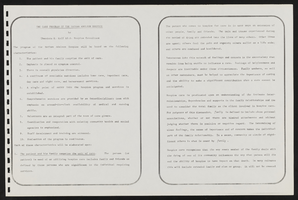
Program for the Design and Operation of The Nathan Adelson Hospice, circa 1980
Date
Archival Collection
Description
A program for the design and operation of The Nathan Adelson Hospice in Las Vegas, Nevada. Included in the program are several appendices on functions, regulations, services, and standards, along with several pages on establishing goals for the hospice. Pages near the end include hand-drawn diagrams and several monetary finance charts.
Text
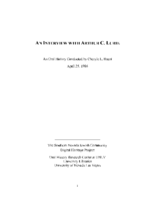
Transcript of interview with Arthur "Art" Lurie by Cheryle Bacot, April 25, 1986
Date
Archival Collection
Description
Interview with Arthur "Art" Lurie by Cheryle Bacot on April 25, 1986. Lurie talks about his family and upbringing with Kenny Washington, who was the first African American to sign with the National Football League. Lurie discusses knowing everybody in Las Vegas in the 1950s, being in the service/retail sector and watching the city grow. He operated several businesses including grocery stores and the liquor department at Wonder World. He talks about his love of boxing, serving on the boxing commission, and advantages of living in southern Nevada.
Arthur C. Lurie lived in Las Vegas for 33 years at the time of this 1986 oral history. He and his wife Eleanor had relocated from Los Angeles area to help run his brother-in-law's food market. Over the years his career would include the grocery, bar (Art's Place) and restaurant businesses; including being co-owner of the liquor store at Wonder World. He shares memories of adjusting to the more laid back culture of small town Las Vegas and how he feels like a native after watching the city grow over the past decades. Art was a founding member of Temple Beth Sholom, where he served as an early vice-president. Being in the non-gaming sector provided gave him the opportunity to work with youth programs and he started the Golden Gloves gym in Las Vegas. He judged over 40 title fights and had a long career on the Nevada Boxing Commission. Arthur Lurie past away in 2014 at the age of 96.
Text
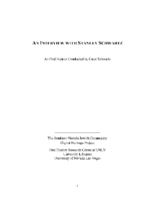
Transcript of interview with Stanley Schwartz by Carol Schwartz, March 1, 1980
Date
Archival Collection
Description
Interview with Stanley Schwartz by Carol Schwartz on March 1, 1980. Stanley talks about coming to Las Vegas in 1951 to open a clothing business on Main Street, Schwartz Brothers Clothing. He compares the business district of the 1950s to the district in 1980, and advertising opportunities in the newspapers and on the radio. Schwartz talks about suit styles and changing preferences of buyers, and moving the store to Second Street, then Fremont Street, then to Maryland Square Shopping Center. In 1970, he changed the focus of the clothing store to "big and tall" and talks about the importance of customer service in retaining customers. He mentions Al Benedict and Herb Tobman as people he admired.
Text
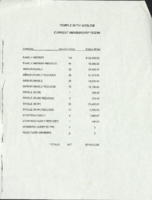
Minutes from Temple Beth Sholom Board of Directors meetings, June 1996 - May 1997
Date
Archival Collection
Description
Meeting minutes include reports from committees of the board, correspondence, and balance sheets.
Text
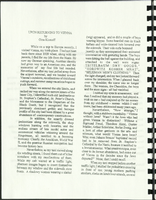
Compilation of writings from the Holocaust Survivors' Group, circa 1998
Date
Archival Collection
Description
Bound compilation of four issues of the Holocaust Survivors' Group essays and poems.
Text
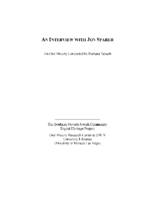
Transcript of interview with Jon Sparer by Barbara Tabach, March 4, 2015
Date
Archival Collection
Description
In this interview, Jon Sparer discusses his involvement as the architect of Congregation Ner Tamid's synagogue in Green Valley. He explains details of the building including the concrete tilt-up form, glass windows and the incorporation of quotes throughout the building. Sparer also discusses his involvement with the Gay and Lesbian Community Center of Southern Nevada (The Center) as a board member.
According to architect Jon Sparer, when he moved to Las Vegas in the early 1980s, the art of the deal was still based on a "handshake." It was just after the infamous MGM fire and Jon went to work for Rissman and Rissman. He later worked for Marnell Corrao Associates until 2001, and then as a principal in his own firm. He is now retired. While honing his design skills with the exciting transformation of the Strip into a world-class destination, Jon also became an active contributor to the Las Vegas community. Among his most notable experiences was being on the search committee for a new location for the fast growing Congregation Ner Tamid and then the architectural design for the synagogue's location in Henderson. It was a unique experience and Jon tells how he approached each aspect of the religious facility and how it would provide a memorable setting for life experiences. Jon has been involved with Jewish Family Services and the Anti-Defamation League (ADL). In addition, Jon along with his husband John Klai have been instrumental in the LGBTQ community and the opening of the Gay and Lesbian Community Center of Southern Nevada [The Center]. In this interview, he also talks about the significance of The Center/ and its success in working with the Clark County Health District, as well as providing a user-friendly experience for all who visit The Center and the Bronze Cafe located there.
Text

Transcript of interview with Gertrude Greenblatt by Dario Gratini, March 1, 1981
Date
Archival Collection
Description
Interview with Gertrude Greenblatt by Dario Gratini on March 1, 1981. In this interview Greenblatt talks about arriving in Las Vegas in the 1940s, and the changes that took place place such as population growth, price increases, employment requirements, and recreation. She also talks about the changes in utilities and environmental issues.
Text

Transcript of interview with Gil Cohen by Claytee White, August 5, 2014
Date
Archival Collection
Description
Interview with Gil Cohen by Claytee White on August 5, 2015. In this interview, Cohen discusses growing up in Las Vegas and attending University of Nevada at Reno. He returned to Las Vegas to join the management training program at the Stardust. He talks about his friendships with Moe Dalitz and Carl Cohen, and his interest in golfing. He also discusses corporate ownership of casinos, unions, and his experiences working at different Strip hotels.
Gil Cohen came to Las Vegas in 1957, when was ten years old, when his father, Yale Cohen, was recruited by Moe Dalitz to work at the Stardust Hotel and Casino. Cohen graduated from University of Nevada Reno, and started working at the Stardust through the management-training program. In 1975, he was made hotel manager, his first of many leadership positions in Strip properties, which have included the Dunes, Aladdin, Hacienda and Monte Carlo, where he currently works as a casino host.
Text
